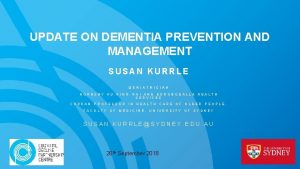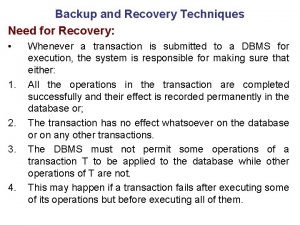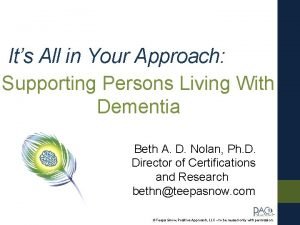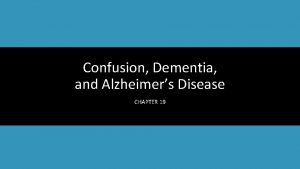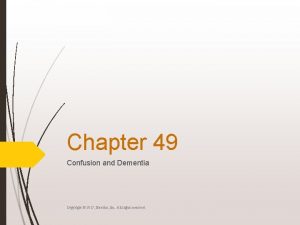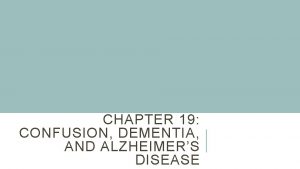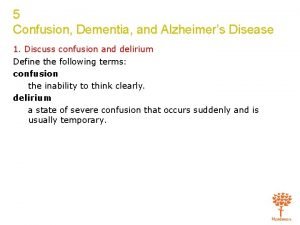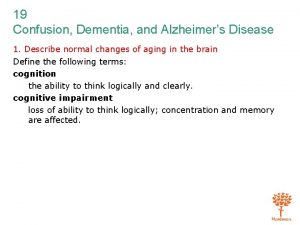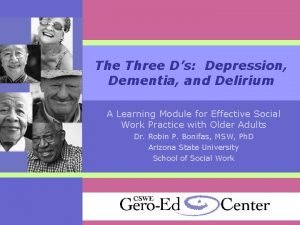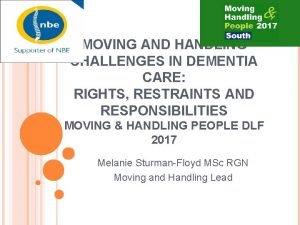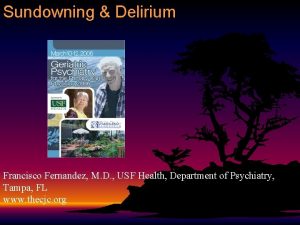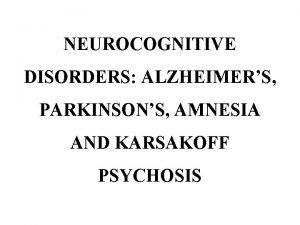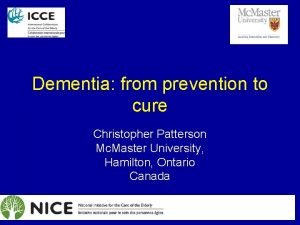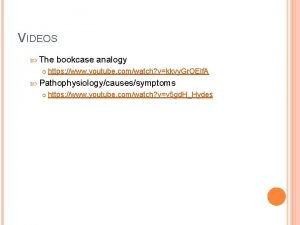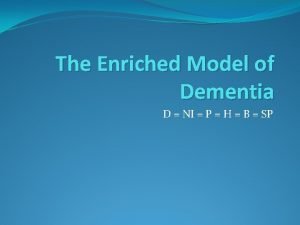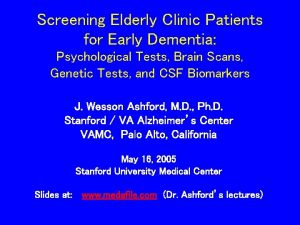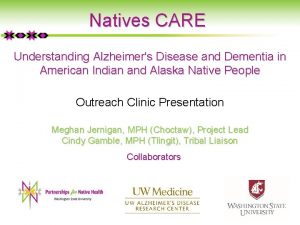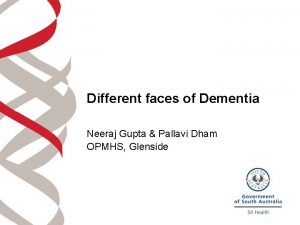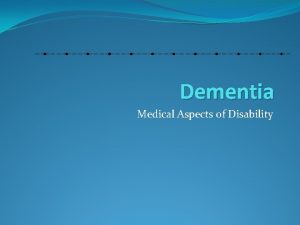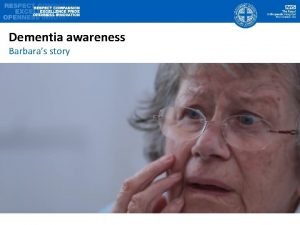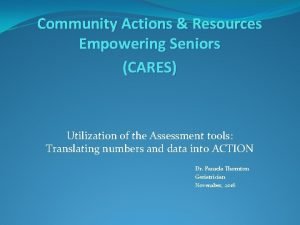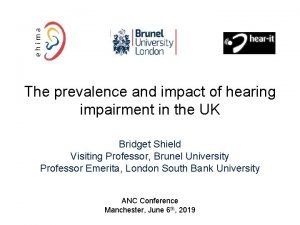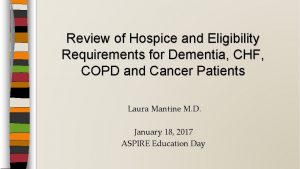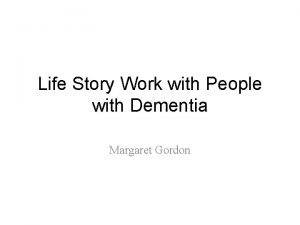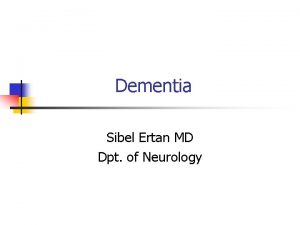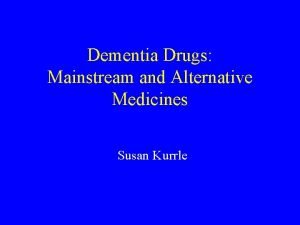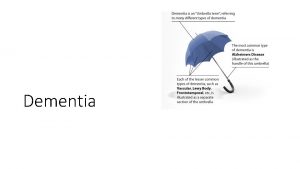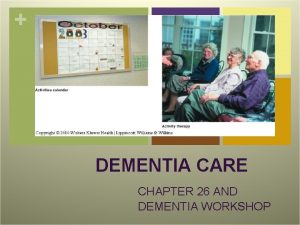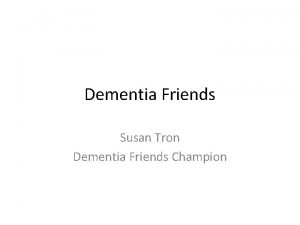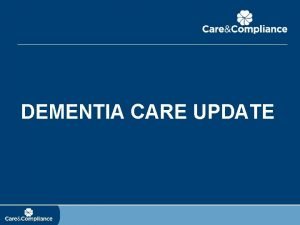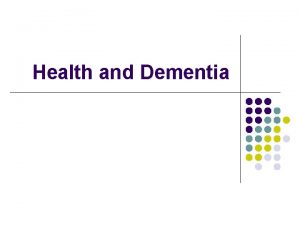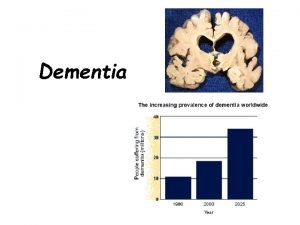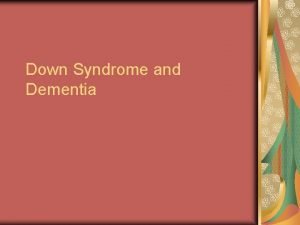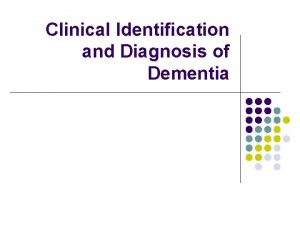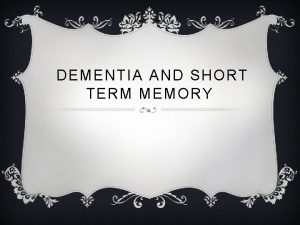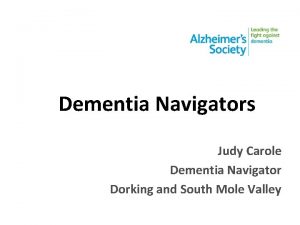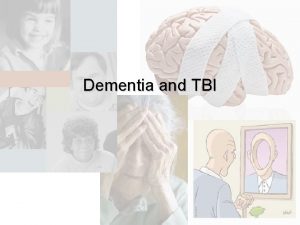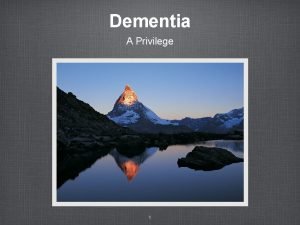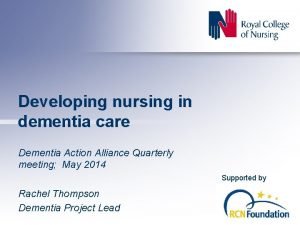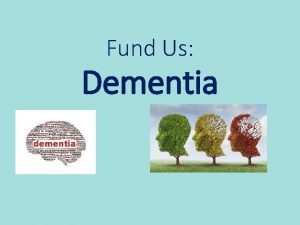UPDATE ON DEMENTIA PREVENTION AND MANAGEMENT SUSAN KURRLE



























- Slides: 27

UPDATE ON DEMENTIA PREVENTION AND MANAGEMENT SUSAN KURRLE GERIATRICIAN HORNSBY CURRAN KU-RING-GAI AND EUROBODALLA SERVICES PROFESSOR FACULTY OF IN HEALTH MEDICINE, CARE OF UNIVERSITY HEALTH OLDER OF PEOPLE, SYDNEY SUSAN. KURRLE@SYDNEY. EDU. AU 26 th September 2018

LIFE EXPECTANCY IN AUSTRALIA: MEN 81 YEARS WOMEN 85 YEARS 2

DEMENTIA • “de mens” – without mind • progressive irreversible syndrome of impaired memory, intellectual function, personality and behaviour, causing significant impairment in function 3

TYPES OF DEMENTIA • Alzheimer’s Disease • Vascular Dementia • “Mixed” Dementia (Alzheimer’s Disease and Vascular Dementia) • Dementia with Lewy Bodies • Frontotemporal Dementia (aka Frontotemporal Lobar Degeneration) • Parkinson’s Disease with Dementia • Others – alcohol related brain damage, chronic traumatic encephalopathy 4

DEMENTIA IN AUSTRALIA 5 • • 2018: 400, 000 + people with dementia • highest cause of disability in >65 years group • approx 25, 000 people under age 65 with dementia 2050: 900, 000 people with dementia approx 1800 new cases per week diagnosed at age 65: 1 in 12 people have dementia at age 80: 1 in 4 people have dementia at age 90: 1 in 2 people have dementia leading cause of death for women, 2 nd highest for men after heart disease

IS DEMENTIA INEVITABLE IF WE LIVE LONG ENOUGH?

MADAME JEANNE CALMENT • Took up fencing, aged 85 • Rode bicycle till 100 • Lived alone till 110 • Port wine, 2 cigs/ day, 1 kg dark chocolate every week • Gave up smoking at 120 • Poured olive oil on food and rubbed it onto her skin • Outlived husband, child and grandchildren Died 122 without dementia 7

MODIFIABLE RISK FACTORS FOR DEVELOPING AD Up to 1/3 of cases of Alzheimer’s disease are related to 7 modifiable risk factors: • • 8 4% type II diabetes 7% midlife obesity 7% low cognitive activity 8% midlife hypertension 11% depression 11% smoking 21% physical inactivity Barnes 2011; Norton 2014

THE LANCET COMMISSION ON DEMENTIA REPORT JULY 2017 9

MODIFIABLE RISK FACTORS FOR DEMENTIA 10

PREVENTION: DOES IT WORK? • FINGER Study from Finland - findings from this study suggest that a multi domain intervention of exercise, diet, cognitive activity and watching BP and cholesterol, may improve or maintain cognitive functioning in at risk older people • Evidence from a number of studies from UK, Europe and US indicates that comparing 2 groups of older people 10 years apart shows lower incidence of dementia • This is thought to be due to better control of risk factors, and higher education levels 11 Ngandu 2015

PREVENTION Physical Exercise • Aerobic exercise: at least 30 mins 5 X per week, • resistance training 2 -3 sessions/week, balance training • Regular aerobic exercise improves cognitive function, stimulates BDNF, increases brain size, and decreases amyloid in the brain and body • Decreases all cause dementia risk by 20% 12 Erickson 2011; Alz Aust 2013

PREVENTION Mental exercise • Higher level education protective, continuing education important • Ongoing complex mental activity – new language, musical instrument, chess, computer games • Cognitive training specifically for dementia is probably effective 13 13

PREVENTION Diet • Mediterranean diet, high poly unsaturated fats, green leafy vegetables, ? curcumin Hormone replacement therapy in women • Oestrogen from menopause improves memory • decreases mortality, heart disease (CCF and IHD) with no increase in cancer, venous thromboembolism, stroke Nonsteroidal anti inflammatory drugs 14 Brinton 2018; Rocca 2018

PREVENTION 15

RESEARCH IN DEMENTIA

ADVANCES IN DEMENTIA RESEARCH Drugs: • Cause of AD still unknown • Most “research breakthrough” headlines relate to mice and rat populations • Multiple (> 200) negative trials at Phase 3 levels in humans • Monoclonal antibody trials including crenezumab and aducanamab, and Anavex 2 -73 in trials in Australia • Monoclonal antibody BAN 2401 Phase 2 results released showing clearing of amyloid, and some improvement in cognition • Chinese medicine triple therapy trial underway for vascular dementia 17

RESIDENTIAL AGED CARE FOR PEOPLE WITH DEMENTIA What is the best model of residential care for people with dementia? 18 • Traditional institution style or domestic homelike style? • In a study of 541 older people (most with cognitive impairment or dementia) across 17 facilities in 3 Australian states, the homelike model of care (aka cottage model) showed significantly higher quality of life, lower hospitalisations (particularly presentations to ED), and lower psychotropic medication use, and cost significantly less than the traditional institutional model

MANAGEMENT OF DEMENTIA

EVIDENCE BASED CARE FOR PEOPLE WITH DEMENTIA: CLINICAL PRACTICE GUIDELINES FOR PEOPLE WITH DEMENTIA 20 • First evidence based guidelines developed • Approved by NHMRC so considered “gold standard” • 109 recommendations covering dementia from diagnosis to death, in all settings • Released March 2016

CONSUMER COMPANION GUIDE: SYDNEY. EDU. AU/MEDICINE/CDPC/DOCUMENTS/RESOURCES/CONSUMERCOMPANION-GUIDE. PDF 21

EXAMPLES OF RECOMMENDATIONS: CARE 22

CURRENT TREATMENT RECOMMENDATIONS FOR ALZHEIMER’S DISEASE AND OTHER DEMENTIAS • Physical exercise – aerobic and resistance • Occupational therapy interventions • Cognitive training • (Vit E) • Support and education for carers • 23 Symptomatic treatment for Alzheimer’s disease: • Cholinesterase inhibitors – donepezil, rivastigmine, galantamine for mild to moderate Alzheimer’s disease • Memantine for moderate to moderately severe Alzheimer’s disease

PLANNING AHEAD AFTER DIAGNOSIS 24 • Enduring guardianship: • For health care and medical consents, services, accommodation, access etc • Enduring power of attorney: • To manage legal and financial affairs • Will • Advance care directive: • To express preferences for the future when no longer capable of making decisions • Link with enduring guardianship • Working: • Consider simpler tasks • Work part time and move to retirement

PLANNING AHEAD AFTER DIAGNOSIS • Driving: • People with diagnosis of dementia may continue to drive but need to notify driver licensing authority and have a conditional or restricted licence • On road tests probably the most reliable indication of driving • Begin transition to non-driving using public transport if possible or other services (other family members, volunteers, taxis, care providers) • Encourage self limiting of driving and then surrendering of licence – “retiring” from driving, and obtain photo ID card 25 http: //www. austroads. com. au/drivers-vehicles/assessing-fitness-todrive

COMMON PHYSICAL CONDITIONS IN DEMENTIA Conditions that are significantly more common in people with dementia: • Epilepsy – 7 times as common • Falls – 3 times as common • Delirium – 5 times as common • • • 26 Malnutrition – 2 times as common Dental disease – 2 times as common Incontinence – 3 times as common Visual problems – 3 times as common Sleep problems – 2 times as common

QUESTIONS
 Susan kurrle
Susan kurrle Primary prevention secondary prevention tertiary prevention
Primary prevention secondary prevention tertiary prevention Alternative of log based recovery
Alternative of log based recovery 3 zones of space and awareness dementia
3 zones of space and awareness dementia Chapter 19 confusion dementia and alzheimer's disease
Chapter 19 confusion dementia and alzheimer's disease Chapter 49 confusion and dementia
Chapter 49 confusion and dementia Confusion dementia and alzheimer disease chapter 19
Confusion dementia and alzheimer disease chapter 19 Confusion dementia and alzheimer's disease
Confusion dementia and alzheimer's disease A helpful way for an na to respond to hallucinations is to
A helpful way for an na to respond to hallucinations is to Difference between dementia and delirium
Difference between dementia and delirium Wendylett sheets 1 carer
Wendylett sheets 1 carer Difference between delirium and dementia ppt
Difference between delirium and dementia ppt Amnesia
Amnesia Dementia treatments and interventions near patterson
Dementia treatments and interventions near patterson Bookcase analogy dementia
Bookcase analogy dementia Dementia pugilistica
Dementia pugilistica Enriched model of dementia care
Enriched model of dementia care Glycogen storage disease mnemonic
Glycogen storage disease mnemonic Dementia 2015
Dementia 2015 Tom kitwood enriched model of dementia care
Tom kitwood enriched model of dementia care Reversible dementia
Reversible dementia Epilepsy
Epilepsy Barbara's story dementia
Barbara's story dementia Fast scale for dementia
Fast scale for dementia Risk factor dementia
Risk factor dementia Hospice lcd dementia
Hospice lcd dementia Life story work dementia
Life story work dementia Dementia ddx
Dementia ddx
